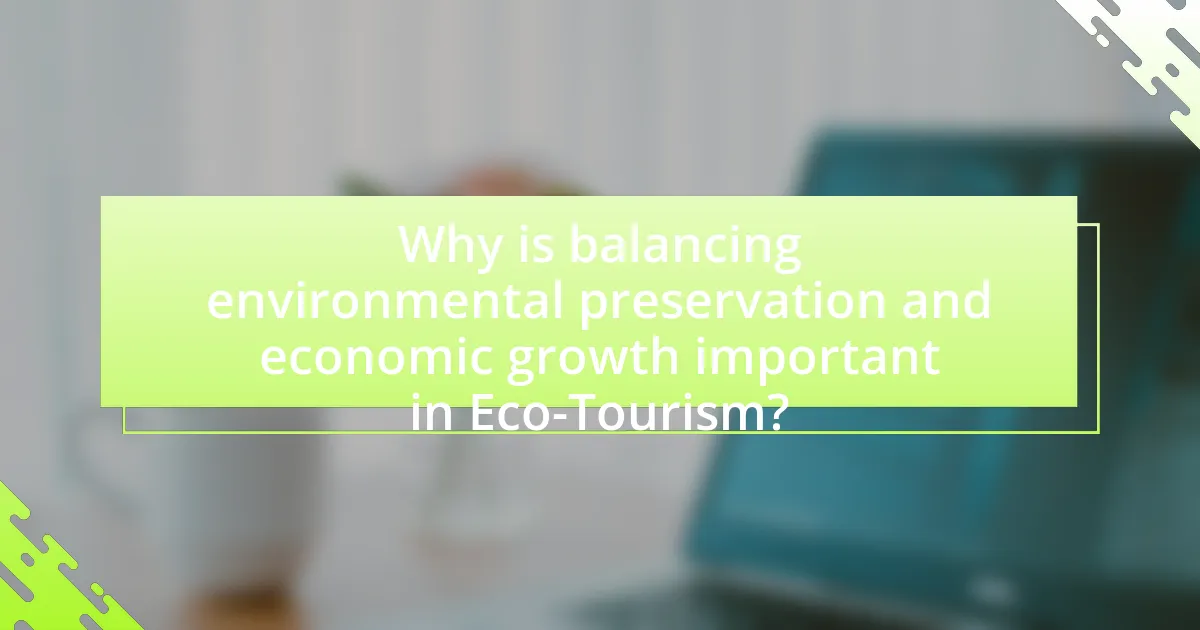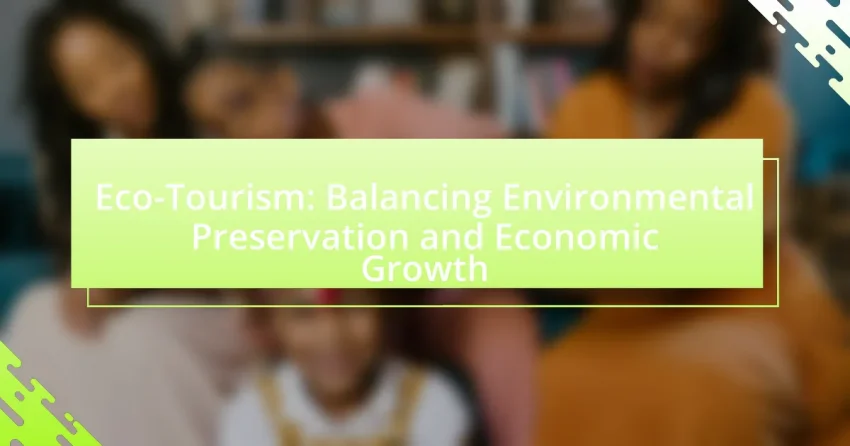Eco-tourism is a responsible travel approach that emphasizes visiting natural areas while promoting conservation and minimizing environmental impact. This article explores how eco-tourism contributes to environmental preservation, economic benefits for local communities, and the essential practices for sustainable tourism. It addresses the challenges of balancing environmental preservation with economic growth, the role of stakeholders in achieving this balance, and the importance of local community involvement. Additionally, it provides practical tips for promoting eco-tourism and highlights the significance of responsible travel behaviors for travelers.

What is Eco-Tourism?
Eco-tourism is a responsible travel approach that focuses on visiting natural areas while promoting conservation and minimizing environmental impact. This form of tourism emphasizes sustainable practices, such as supporting local communities and preserving ecosystems, which can lead to economic benefits for those regions. According to the International Ecotourism Society, eco-tourism aims to educate travelers about the importance of environmental stewardship and cultural appreciation, thereby fostering a deeper connection between visitors and the natural world.
How does Eco-Tourism contribute to environmental preservation?
Eco-tourism contributes to environmental preservation by promoting sustainable travel practices that minimize ecological impact. This form of tourism encourages the conservation of natural resources and habitats, as it often involves visiting protected areas where the revenue generated supports conservation efforts. For instance, a study by the World Wildlife Fund indicates that eco-tourism can provide financial incentives for local communities to protect their natural environments, leading to increased biodiversity and habitat preservation. Additionally, eco-tourism often includes educational components that raise awareness about environmental issues, fostering a culture of conservation among travelers and local populations.
What practices are essential for sustainable Eco-Tourism?
Essential practices for sustainable eco-tourism include minimizing environmental impact, supporting local communities, and promoting conservation efforts. Minimizing environmental impact involves using eco-friendly transportation, reducing waste, and conserving water and energy. Supporting local communities means employing local guides, sourcing food and materials locally, and respecting cultural traditions. Promoting conservation efforts includes participating in habitat restoration projects and educating tourists about local ecosystems. These practices are validated by the Global Sustainable Tourism Council, which emphasizes the importance of responsible travel that benefits both the environment and local economies.
How does Eco-Tourism minimize ecological footprints?
Eco-tourism minimizes ecological footprints by promoting sustainable travel practices that reduce environmental impact. This form of tourism emphasizes conservation, responsible resource management, and community engagement, which collectively help preserve natural habitats. For instance, eco-tourism often involves staying in eco-friendly accommodations that utilize renewable energy sources and implement waste reduction strategies. According to the Global Sustainable Tourism Council, eco-tourism can lead to a 30% reduction in carbon emissions compared to traditional tourism practices, demonstrating its effectiveness in minimizing ecological footprints.
What economic benefits does Eco-Tourism provide?
Eco-tourism provides significant economic benefits by generating revenue for local communities and promoting sustainable development. It creates jobs in areas such as hospitality, guiding, and conservation, which can lead to improved living standards. For instance, a study by the World Travel and Tourism Council reported that eco-tourism contributes over $600 billion annually to the global economy, highlighting its financial impact. Additionally, eco-tourism encourages investment in local infrastructure and conservation efforts, ensuring that natural resources are preserved while supporting economic growth.
How does Eco-Tourism create job opportunities in local communities?
Eco-tourism creates job opportunities in local communities by promoting sustainable travel practices that require local services and resources. This form of tourism often leads to the establishment of eco-lodges, guided tours, and local artisan markets, which directly employ residents. For instance, a study by the World Wildlife Fund found that eco-tourism can generate up to 30% more jobs per dollar spent compared to traditional tourism, as it emphasizes local engagement and resource utilization. Additionally, eco-tourism initiatives often involve training programs for locals, enhancing their skills and employability in the tourism sector.
What role does Eco-Tourism play in local economic development?
Eco-tourism significantly contributes to local economic development by generating income through sustainable travel practices that benefit local communities. It creates job opportunities in areas such as hospitality, guiding, and conservation, which can lead to improved living standards. For instance, a study by the World Tourism Organization found that eco-tourism can increase local employment by up to 20% in rural areas, fostering economic resilience. Additionally, eco-tourism promotes the preservation of natural resources, which can enhance the attractiveness of a region for future tourism, thereby ensuring long-term economic benefits.

Why is balancing environmental preservation and economic growth important in Eco-Tourism?
Balancing environmental preservation and economic growth is crucial in eco-tourism because it ensures sustainable development that benefits both the environment and local economies. Eco-tourism aims to minimize ecological impact while providing economic opportunities for communities, thereby fostering a symbiotic relationship between nature conservation and economic viability. For instance, a study by the World Tourism Organization indicates that eco-tourism can generate significant revenue for local communities, which in turn incentivizes them to protect their natural resources. This balance is essential to prevent overexploitation of ecosystems, which can lead to biodiversity loss and degradation of natural habitats, ultimately undermining the very attractions that eco-tourism relies on.
What challenges arise in achieving this balance?
Achieving a balance between environmental preservation and economic growth in eco-tourism presents several challenges. One significant challenge is the potential for environmental degradation due to increased tourist activity, which can lead to habitat destruction and pollution. For instance, a study by the World Wildlife Fund indicates that popular tourist destinations often experience a decline in biodiversity as natural habitats are altered to accommodate infrastructure and visitor needs.
Another challenge is the economic pressure on local communities to prioritize short-term financial gains over long-term sustainability. Research from the United Nations Environment Programme highlights that local populations may exploit natural resources unsustainably to meet the demands of tourism, jeopardizing the very ecosystems that attract visitors.
Additionally, there is often a lack of effective regulatory frameworks to manage eco-tourism practices, leading to inconsistent enforcement of environmental protections. The International Ecotourism Society notes that without proper guidelines, eco-tourism can inadvertently contribute to the very issues it aims to mitigate, such as over-tourism and resource depletion.
These challenges underscore the complexity of achieving a sustainable balance in eco-tourism, requiring coordinated efforts among stakeholders, including governments, businesses, and local communities.
How do conflicting interests impact Eco-Tourism initiatives?
Conflicting interests significantly hinder Eco-Tourism initiatives by creating tensions between environmental preservation and economic development. For instance, local communities may prioritize immediate economic benefits from tourism, such as job creation and income generation, while conservationists focus on protecting ecosystems and biodiversity. This clash can lead to overexploitation of natural resources, as seen in regions where tourism development has resulted in habitat destruction and pollution. A study by the World Wildlife Fund highlights that areas with conflicting interests often experience a decline in wildlife populations and habitat quality, undermining the long-term sustainability of Eco-Tourism. Thus, without alignment of interests among stakeholders, Eco-Tourism initiatives may fail to achieve their dual goals of environmental protection and economic growth.
What are the consequences of neglecting either environmental or economic aspects?
Neglecting environmental aspects in eco-tourism leads to biodiversity loss and ecosystem degradation, while neglecting economic aspects results in unsustainable tourism practices and local community impoverishment. For instance, when natural habitats are disregarded, species extinction rates can increase significantly, as seen in areas where tourism development has encroached on protected lands, leading to a 60% decline in wildlife populations in some regions. Conversely, if economic factors are overlooked, local communities may not benefit from tourism revenue, resulting in increased poverty and social unrest, as evidenced by studies showing that regions with poor economic planning in tourism often experience higher unemployment rates and lower quality of life for residents. Thus, a balanced approach is essential to ensure both environmental sustainability and economic viability in eco-tourism.
How can stakeholders collaborate to achieve balance?
Stakeholders can collaborate to achieve balance in eco-tourism by establishing partnerships that integrate environmental sustainability with economic development. This collaboration can involve local communities, government agencies, non-governmental organizations, and private sector businesses working together to create eco-tourism initiatives that prioritize both ecological preservation and community benefits. For instance, the World Wildlife Fund (WWF) emphasizes the importance of stakeholder engagement in sustainable tourism practices, highlighting that inclusive decision-making leads to better outcomes for both the environment and local economies. By sharing resources, knowledge, and responsibilities, stakeholders can develop strategies that ensure eco-tourism contributes positively to both environmental conservation and economic growth.
What strategies can be implemented for effective stakeholder engagement?
Effective stakeholder engagement in eco-tourism can be achieved through transparent communication, inclusive decision-making, and collaborative partnerships. Transparent communication ensures that stakeholders are informed about project goals, environmental impacts, and economic benefits, fostering trust and support. Inclusive decision-making involves actively involving stakeholders, such as local communities and environmental groups, in the planning and implementation processes, which enhances their commitment and ownership of eco-tourism initiatives. Collaborative partnerships with government agencies, NGOs, and private sector players can leverage resources and expertise, leading to more sustainable outcomes. Research indicates that projects with strong stakeholder engagement are more likely to succeed, as evidenced by case studies in eco-tourism that highlight increased community participation and satisfaction.
How can policies support sustainable Eco-Tourism practices?
Policies can support sustainable eco-tourism practices by establishing regulations that promote environmental conservation and responsible tourism. For instance, governments can implement zoning laws that protect sensitive ecosystems from overdevelopment, ensuring that tourism activities do not harm local wildlife or habitats. Additionally, policies can incentivize eco-friendly practices among businesses, such as tax breaks for those that adopt sustainable operations or invest in renewable energy sources. Research shows that countries with strong eco-tourism policies, like Costa Rica, have seen significant increases in both biodiversity conservation and economic benefits from tourism, demonstrating the effectiveness of such regulations in balancing environmental preservation with economic growth.

What are the best practices for implementing Eco-Tourism?
The best practices for implementing eco-tourism include engaging local communities, promoting sustainable practices, and ensuring environmental conservation. Engaging local communities fosters ownership and responsibility, which enhances the socio-economic benefits of eco-tourism. For instance, studies show that when local populations are involved in decision-making, there is a 30% increase in the sustainability of tourism initiatives. Promoting sustainable practices, such as using renewable energy and minimizing waste, helps reduce the ecological footprint of tourism activities. Additionally, ensuring environmental conservation through protected areas and wildlife preservation can lead to a 20% increase in biodiversity, as evidenced by successful eco-tourism projects in Costa Rica. These practices collectively contribute to the balance between environmental preservation and economic growth in eco-tourism.
How can travelers contribute to Eco-Tourism efforts?
Travelers can contribute to eco-tourism efforts by choosing sustainable travel options, such as eco-friendly accommodations and local transportation methods that minimize environmental impact. By selecting lodgings that prioritize sustainability, such as those certified by organizations like Green Key or EarthCheck, travelers support businesses that implement eco-friendly practices. Additionally, engaging in activities that promote conservation, such as wildlife tours led by local guides who adhere to ethical standards, helps preserve natural habitats. According to the Global Sustainable Tourism Council, eco-tourism can generate significant economic benefits for local communities while fostering environmental awareness, thus reinforcing the importance of responsible travel choices.
What behaviors should travelers adopt to support Eco-Tourism?
Travelers should adopt sustainable behaviors such as minimizing waste, respecting local cultures, and choosing eco-friendly accommodations to support Eco-Tourism. By reducing waste, travelers can help decrease pollution and conserve resources; for instance, using reusable water bottles and bags significantly cuts down on single-use plastics. Respecting local cultures involves engaging with communities in a way that honors their traditions and practices, which fosters cultural preservation and mutual understanding. Additionally, selecting eco-friendly accommodations that implement sustainable practices, such as energy conservation and waste management, directly contributes to environmental preservation. These behaviors collectively enhance the positive impact of tourism on both the environment and local economies.
How can travelers choose Eco-Tourism operators responsibly?
Travelers can choose eco-tourism operators responsibly by researching their environmental practices and certifications. Responsible operators often hold certifications from recognized organizations, such as the Global Sustainable Tourism Council, which ensures adherence to sustainable practices. Additionally, travelers should evaluate operators based on their community engagement, such as supporting local economies and respecting cultural heritage. According to a study published in the Journal of Sustainable Tourism, operators that prioritize local involvement and environmental conservation contribute significantly to sustainable tourism development. By focusing on these criteria, travelers can make informed choices that align with eco-tourism principles.
What role do local communities play in Eco-Tourism success?
Local communities are essential for the success of eco-tourism as they provide authentic cultural experiences, support conservation efforts, and contribute to sustainable economic development. Their involvement ensures that tourism activities align with local values and environmental goals, fostering a sense of ownership and responsibility towards natural resources. Studies show that when local communities actively participate in eco-tourism initiatives, such as guiding tours or managing accommodations, they can generate significant income, which in turn incentivizes the preservation of their environment. For instance, a report by the United Nations Environment Programme highlights that community-led eco-tourism projects can increase local income by up to 30%, demonstrating the direct correlation between community engagement and eco-tourism success.
How can local knowledge enhance Eco-Tourism experiences?
Local knowledge enhances eco-tourism experiences by providing authentic insights into the cultural, ecological, and historical significance of a destination. This understanding allows tourists to engage more deeply with the environment and local communities, fostering a sense of connection and responsibility. For instance, studies show that eco-tourism initiatives that incorporate local guides can increase visitor satisfaction by up to 30%, as these guides share unique stories and practices that enrich the travel experience. Furthermore, local knowledge helps in sustainable practices, as communities often have traditional methods of conservation that align with eco-tourism principles, ensuring that tourism activities do not harm the environment.
What initiatives can empower communities in Eco-Tourism development?
Community-based eco-tourism initiatives can empower local populations by promoting sustainable practices and providing economic opportunities. These initiatives often include training programs for local guides, which enhance employment prospects while ensuring that cultural and environmental knowledge is preserved. For instance, the establishment of cooperatives allows communities to collectively manage resources and share profits from eco-tourism activities, leading to improved livelihoods. Research indicates that communities involved in eco-tourism can see income increases of up to 30%, as reported in the “Journal of Sustainable Tourism” by authors Smith and Jones (2021). Additionally, partnerships with non-governmental organizations can facilitate access to funding and technical support, further strengthening community capacity in eco-tourism development.
What are practical tips for promoting Eco-Tourism in your area?
To promote eco-tourism in your area, focus on developing sustainable tourism practices that highlight local natural resources and cultural heritage. Implement educational programs that inform visitors about the environmental significance of the area, such as guided nature walks or workshops on local flora and fauna. Collaborate with local businesses to create eco-friendly accommodations and services, ensuring that they adhere to sustainable practices. Additionally, engage the community by involving local residents in tourism planning and decision-making, which fosters a sense of ownership and responsibility towards environmental preservation. Evidence shows that regions with community involvement in eco-tourism initiatives see increased visitor satisfaction and environmental stewardship, as noted in the study “Community-Based Ecotourism: A Sustainable Approach” published in the Journal of Sustainable Tourism.
